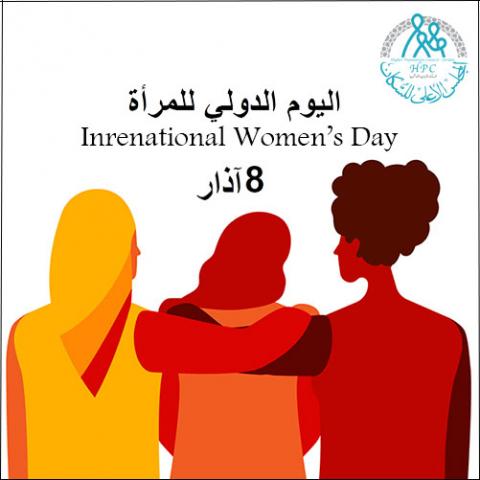

Today, Tuesday, Jordan and the world celebrate International Women’s Day, which falls on March 8th of each year. IWD campaign theme this year worldwide is ‘Gender equality today for a sustainable tomorrow’ to acknowledge the contribution of women and girls around the world who take on the important leadership of adapting to, mitigating and responding to climate change, to build a more sustainable future for all under the slogan: Collectively we can all #BreakTheBias
Celebrating this day aims to promote gender equality in the context of the climate crisis and disaster risk reduction, which is one of the biggest global challenges the world faces in the 21st century.
Secretary-General of the Higher Population Council, Dr. Abla Amawi, stressed the fact that women are more vulnerable to the effects of climate change than men, as they constitute the majority of the world's poor population, and they are more dependent on natural resources, which are particularly threatened by climate change.
Dr. Amawi added that women in Jordan are considered the most vulnerable to the negative impact of global climate change, due to the absence of gender justice and equity in accessing resources and exercising of rights, in addition to the weak governance in making their voices heard in the development and environmental decision-making processes, indicating that women constitute 47% of the total population of the Kingdom. The number of families headed by women amounted to about 392.000 families, representing 17.5 % of the total Jordanian families in 2020. Nevertheless, the economic participation of women is still low, as the rate of economic activity for Jordanian women reached 14.2% compared to 53.6% for males. At the same time, the unemployment rate for females reached 30.7%, compared to 21.2% for males, according to Jordan in figures for the year 2020 and issued by the Department of Statistics, and according to the Population and Family Health Survey for the year 2017-2018, the rates of anemia increased for women aged between 15-49 years to 43%.
Dr. Amawi pointed out that the Higher Population Council pays special attention to this occasion, IWD, as its strategic objectives are linked to the goals of sustainable development, especially the fifth goal ‘Achieving gender equality and empowering all women and girls’, and the tenth goal ‘Reducing inequality within and between countries’; this is also in addition to the HPC concern with empowering women economically, raising the level of their participation in the labor market and enhancing their reproductive health, in order to achieve the optimal investment in the population opportunity.
Globally, women constitute 70% of the 1.3 billion people living in poverty; women living in urban areas are responsible for providing for 40% of the poorest families; women produce 50% to 80% of the world’s food, but they they own less than 10% of land and property. Women and girls make up 40% of the world's displaced people due to disasters and climate change. Climate change is likely to cause more gender-based violence, increase child marriage, and deteriorate sexual and reproductive health.
On another level, women and girls are effective leaders and change-setters in all aspects related to the alleviation of climate change severity and adaptating to it; women engage in various sustainability related initiatives around the world, and their participation and leadership always results in more effective climate action. Therefore, it is imperative to continue to consider opportunities and also barriers to empower women and girls to have their voices heard and participate in decision-making on all issues related to climate change and sustainability if we are to achieve sustainable development; and equally as important is consolidating gender equality, as the world cannot enjoy a sustainable or equal future without achieving gender equity.
The Higher Population Council indicated that the Human Development Report for the year 2020 "Beyond Income, beyond averages, beyond today: Inequalities in human development in the Twenty-first Century" stated that the value of the Human Development Index in Jordan for the year 2019 is 0.723, which puts Jordan in the high human development category at number 102 out of 189 countries; the Gender Development Index for Jordan reached (0.868) compared to (0.941) globally, and the Gender Inequality Index reached (0.469) compared to (0.439) globally.
The Council recommended the necessity of encouraging women’s participation and integrating a gender perspective in the design, approval and implementation of projects financed in the context of climate change, in addition to encouraging the design of projects in areas of interest to the Global Environment Facility which would benefit women, as well as projects managed by women. In addition to developing strategies and mechanisms to increase the proportion of women participating as a decision-maker, planner, manager, scientist, and technical advisor, and as a beneficiary in designing, developing and implementing policies and programs for managing natural resources and protecting and preserving the environment.







